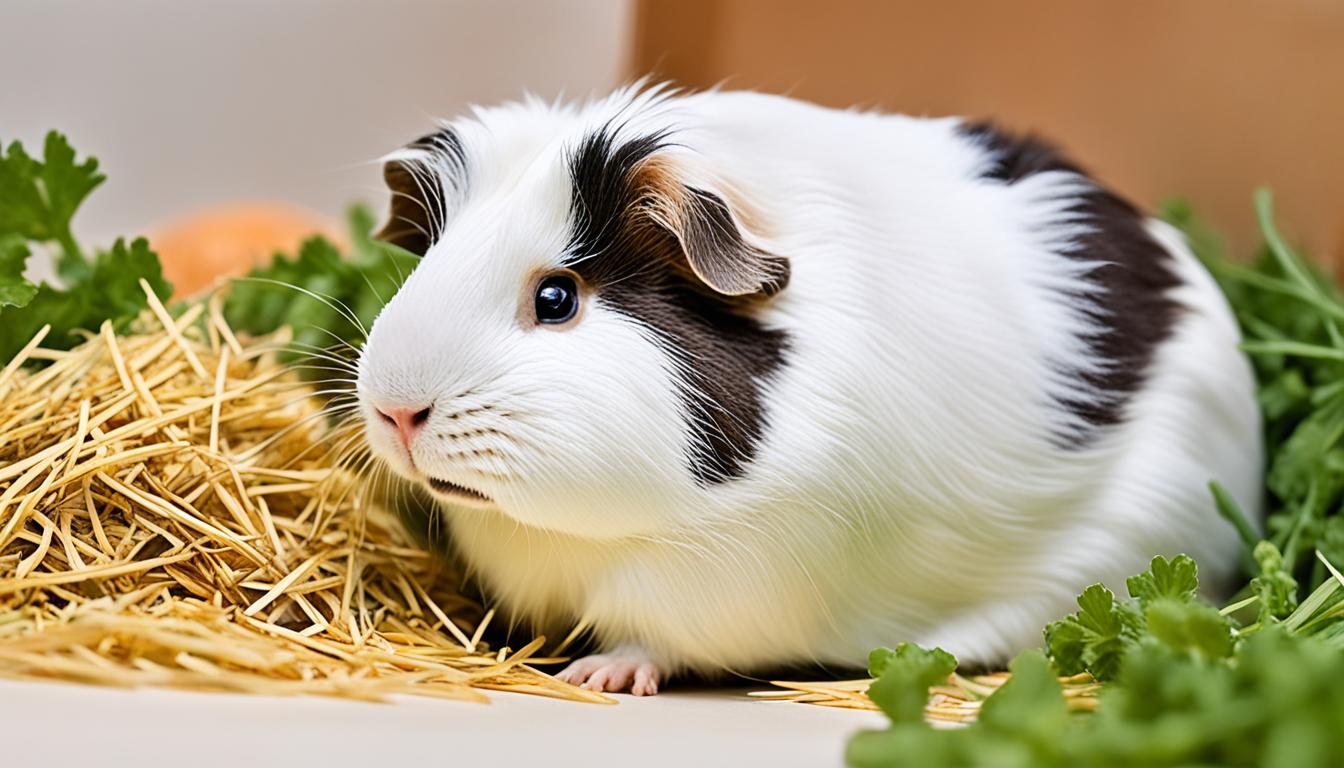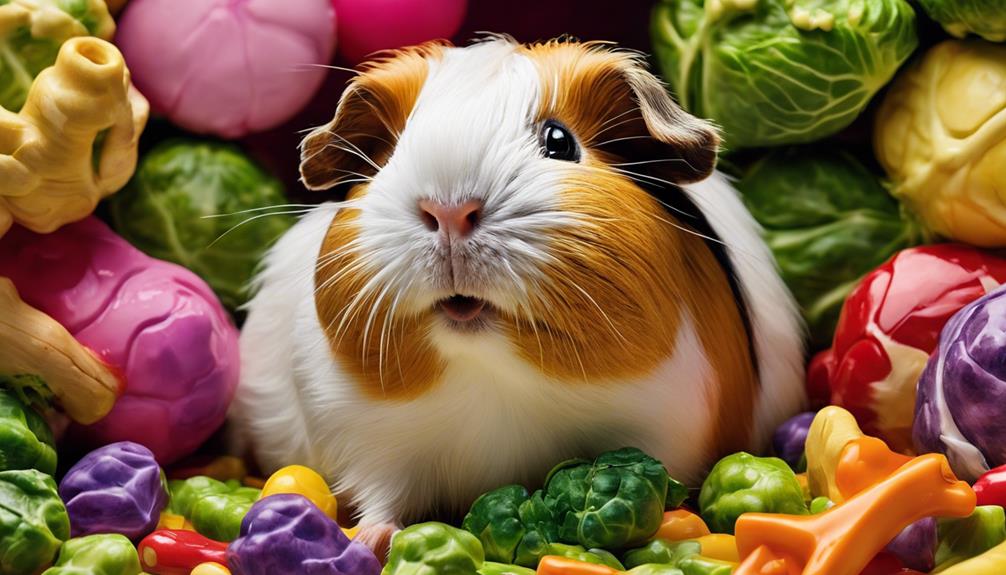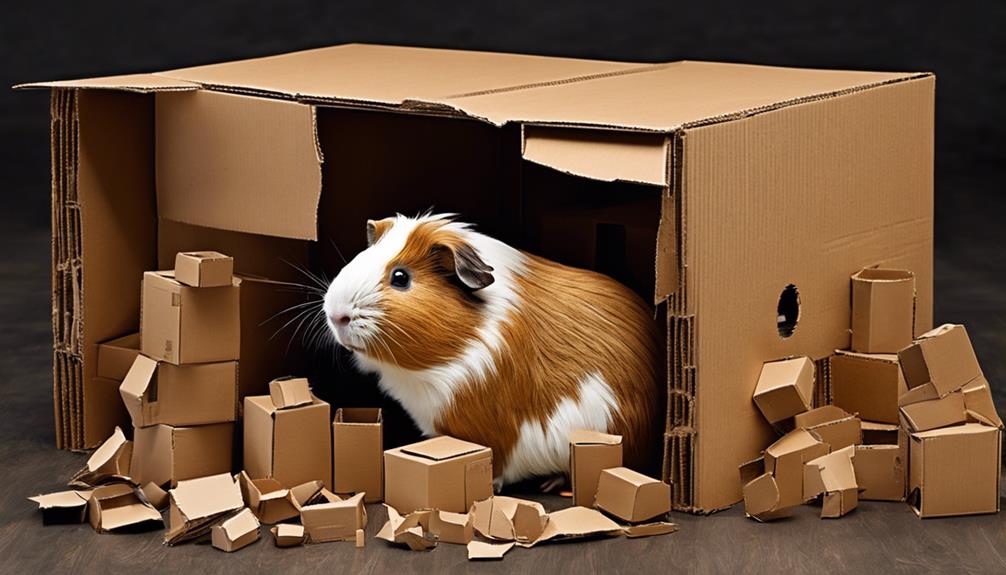Did you know that guinea pigs are incredibly social animals that can form strong bonds with their owners? These lovable pets need special care to guarantee their happiness and health. Whether you’re a new guinea pig owner or want to enhance your current care routine, we have the essential tips and guidance you need. From ensuring they have a large cage to monitoring their diet and providing mental stimulation, we will cover everything you need to know to keep your guinea pigs content and in good health.
Key Takeaways:
- Guinea pigs are highly social animals and thrive in companionship.
- Provide a spacious cage with enough room for exercise and play.
- Monitor their diet to ensure a balanced and healthy nutrition, including hay, pellets, and fresh fruits and vegetables.
- Engage in regular handling and build a bond with your guinea pigs for their well-being.
- Ensure they have a safe and stimulating environment, including hiding places and toys.
The Importance of Cage Size and Setup
Guinea pigs are delightful pets that bring joy to our lives. As responsible pet owners, it’s our duty to ensure that our furry friends have a comfortable and stimulating living environment. One of the key factors in providing a happy and healthy life for guinea pigs is the size and setup of their cage.
Guinea pigs spend a significant amount of time in their cages, so it’s crucial to give them enough space to move, play, and exercise. A spacious cage allows them to express their natural behaviors and prevents them from feeling cramped or stressed. The cage should be large enough to accommodate at least two fully-grown guinea pigs, as they are social animals and enjoy the company of their peers.
When selecting a cage, consider the following guidelines for cage size:
| Number of Guinea Pigs | Minimum Cage Size |
|---|---|
| 1 | Minimum of 7.5 square feet |
| 2 | Minimum of 10.5 square feet |
| 3 or more | Additional 3 square feet per guinea pig |
Along with sufficient space, it’s essential to set up the cage with various enrichment features. Guinea pigs enjoy having hiding places, toys, and tunnels to explore and engage with. These elements provide mental stimulation, encourage natural behaviors, and prevent boredom.
Here are some suggested cage setup additions:
- Hiding Places: Provide cozy hideouts like igloos or fleece-lined tunnels where guinea pigs can retreat and feel safe.
- Toys: Offer a selection of guinea pig-safe toys such as chew toys, tunnels, balls, and puzzle feeders to keep them entertained and mentally stimulated.
- Bedding: Line the cage with appropriate bedding materials, such as fleece, straw, or paper bedding, to create a cozy and comfortable sleeping area.
- Food and Water Containers: Ensure easy access to clean food and water containers that are securely attached to the cage to minimize spills and mess.
Remember to regularly clean the cage, replacing soiled bedding and removing any uneaten food to maintain a hygienic environment for your guinea pigs. Cleanliness is crucial for their health and well-being.
Providing a spacious and well-equipped cage is fundamental in promoting the physical and mental well-being of guinea pigs. It allows them to engage in natural behaviors, fosters their social interaction, and reduces stress. A comfortable and stimulating cage setup is essential for the happiness and overall health of our beloved guinea pig companions.
Monitoring the Diet of Guinea Pigs
Proper nutrition is crucial for the overall well-being of guinea pigs. To ensure that your furry friend is receiving a balanced and healthy diet, it is important to monitor their food intake closely.
Start by providing clean hay for your guinea pig to eat throughout the day. Hay not only serves as a source of fiber but also supports their dental health by promoting natural chewing and wearing down their teeth.
Next, make sure to offer the right kind of pellets that are specifically formulated for guinea pigs. These pellets contain essential nutrients and vitamins to support their overall health. Follow the recommended serving size based on your guinea pig’s weight and age to avoid overfeeding.
In addition to hay and pellets, it is crucial to provide a variety of fresh fruits and vegetables daily. This helps to meet their nutritional needs and adds diversity to their diet. Some recommended fruits and vegetables include leafy greens like kale and spinach, bell peppers, carrots, and apples. However, it’s important to research and avoid feeding them foods that are toxic to guinea pigs.
Remember to introduce new foods gradually to minimize digestive issues. It’s also important to monitor your guinea pig’s reaction to different foods. If you notice any signs of discomfort, such as diarrhea or a lack of appetite, consult with a veterinarian to ensure their diet is appropriate.
Safe Fruits and Vegetables for Guinea Pigs
| Fruits | Vegetables |
|---|---|
| Apples | Kale |
| Strawberries | Spinach |
| Blueberries | Bell Peppers |
| Oranges | Carrots |
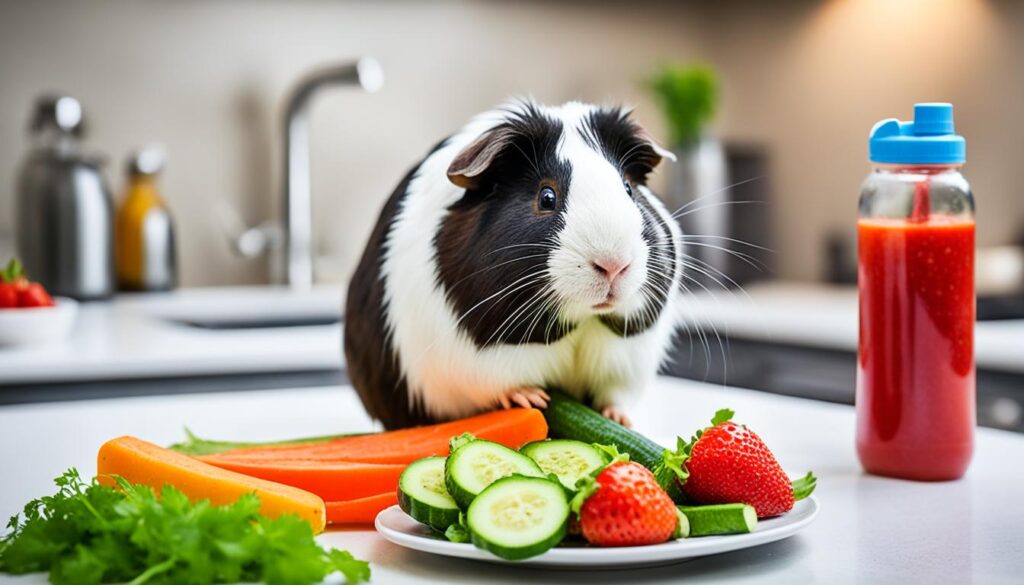
By closely monitoring your guinea pig’s diet and providing a balanced combination of hay, pellets, fruits, and vegetables, you can ensure that they are receiving the essential nutrients they need to thrive. Remember to always consult with a veterinarian for specific dietary recommendations tailored to your guinea pig’s individual needs.
Providing Mental Stimulation and Entertainment
Guinea pigs are social creatures that thrive on mental stimulation and entertainment. To ensure their happiness, it is essential to keep them paired with at least one other guinea pig. The companionship of a fellow guinea pig provides social interaction and prevents loneliness. However, guinea pigs also require additional forms of entertainment to keep them mentally and physically stimulated.
One way to keep your guinea pigs entertained is by providing them with simple toys. Toys such as balls, tunnels, and tubes can provide hours of entertainment, allowing them to explore and play. These toys also serve as hiding places, where guinea pigs can retreat and feel safe. By including these toys in their cage, you are giving them opportunities for mental stimulation and physical exercise.
Here are some examples of toys that can provide mental stimulation and entertainment for your guinea pigs:
- Interactive balls with bells or treats inside
- Cardboard tunnels and tubes for hiding and exploring
- Wooden chew toys to keep their teeth healthy
- Toy bridges or ramps for climbing
When selecting toys for your guinea pigs, ensure they are safe and suitable for their size. Avoid toys with small parts that could be swallowed or that may cause injury. Regularly inspect and clean the toys to keep them hygienic.
Remember, guinea pigs are naturally curious and love to explore. Adding variety to their environment, such as rearranging their toys or providing new ones periodically, can enhance their mental stimulation. You can also engage with your guinea pigs by playing interactive games or teaching them simple tricks.
Furthermore, allowing your guinea pigs to roam in a secure, supervised area outside of their cage can provide additional mental stimulation and exercise. An exercise pen or playpen can create a safe space where they can explore and interact with their surroundings.
By ensuring your guinea pigs have companionship and access to toys and stimulating environments, you are promoting their overall well-being and happiness. Remember to observe their preferences and adjust their toys and activities accordingly, as every guinea pig has unique preferences and personalities.
Below is an image of a guinea pig enjoying a toy:
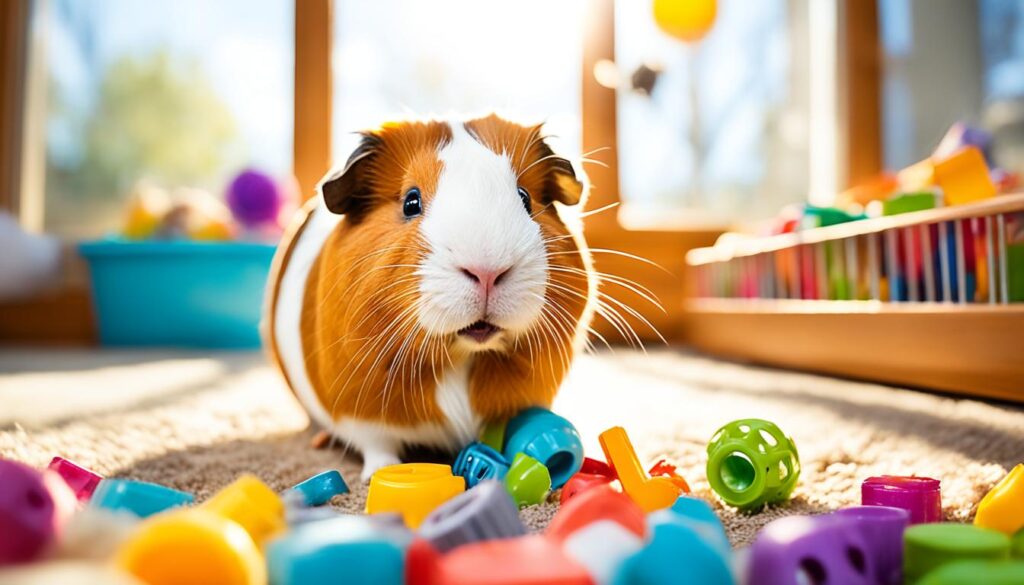
Building a Bond and Giving Attention
Building a strong bond with your guinea pigs is essential for their overall well-being. These affectionate creatures thrive on human attention and benefit from regular handling and interaction.
When spending time with your guinea pigs, make sure to handle them gently and with care. Avoid sudden movements or loud noises that may startle them. Use this time not only to provide affection but also to assess their health and well-being.
During your one-on-one sessions, pay close attention to their ears, nose, eyes, teeth, fur, and skin for any signs of illness or discomfort. Regular health checks help you identify any underlying issues and ensure prompt veterinary intervention.
Remember to give your guinea pigs a safe and comfortable environment during bonding and handling sessions. Use a secure and quiet space, taking into consideration their sensitivities to extreme temperatures and loud noises.
| Body Part | Signs to Observe |
|---|---|
| Ears | Look for any discharge, redness, or signs of irritation |
| Nose | Monitor for sneezing, nasal discharge, or difficulty breathing |
| Eyes | Check for cloudiness, redness, discharge, or crusty build-up |
| Teeth | Inspect for overgrowth, misalignment, or difficulty eating |
| Fur and Skin | Look for bald patches, sores, parasites, or signs of irritation |
By consistently providing attention and affection, you strengthen the bond between you and your guinea pigs. This connection not only promotes their well-being but also enables you to better understand their individual needs and behaviors.

Take the time to show your guinea pigs love and care. Your efforts will be rewarded with a deep and meaningful connection that brings joy to both you and your furry companions.
The Dietary Needs of Guinea Pigs
Guinea pigs have specific dietary needs that are essential for their overall health and well-being. Providing them with a balanced and nutritious diet is crucial to ensure they thrive as happy and healthy pets.
One of the key components of a guinea pig’s diet is high fiber. These adorable creatures require a diet rich in fiber to maintain a healthy gut and proper digestion. A diet high in fiber helps prevent gastrointestinal issues and keeps their digestive system running smoothly.
To fulfill their fiber requirements, guinea pigs should have access to high-quality hay at all times. Hay not only provides the necessary fiber but also aids in wearing down their continuously growing teeth. Timothy hay is particularly recommended, but other types of grass hay such as orchard grass or oat hay can also be included in their diet.
In addition to hay, guinea pig pellets should be provided as a supplementary source of nutrition. These pellets are specifically formulated to meet their dietary needs and contain essential vitamins and minerals. However, it’s important to note that pellets should only be fed in moderation, as they can be high in calories.
Furthermore, fresh fruits and vegetables play a vital role in a guinea pig’s diet. These colorful additions provide essential nutrients, including vitamin C, which is crucial for their health. While guinea pigs, unlike humans, do produce vitamin C on their own, they still require a dietary source to prevent deficiencies.
A variety of fresh fruits and vegetables should be offered daily, providing them with a wide range of nutrients. Some excellent choices include bell peppers, kale, spinach, parsley, and oranges. However, it’s important to introduce new foods gradually and monitor their response, as some guinea pigs may have individual preferences or sensitivities.
Lastly, fresh water should always be available to guinea pigs. Water plays a crucial role in their overall hydration and helps maintain their bodily functions. Ensure that their water bottle or bowl is clean and filled with fresh water daily.
Let’s take a look at a sample guinea pig diet:
| Food | Portion Size |
|---|---|
| Timothy Hay | Unlimited access |
| Guinea Pig Pellets | 1/8 to 1/4 cup per day |
| Fresh Fruits and Vegetables | 1/2 cup per day (divided into two servings) |
| Fresh Water | Always available |
Remember, a well-balanced diet that includes high-quality hay, pellets, and a variety of fresh fruits and vegetables will contribute to the overall health and happiness of your guinea pig.
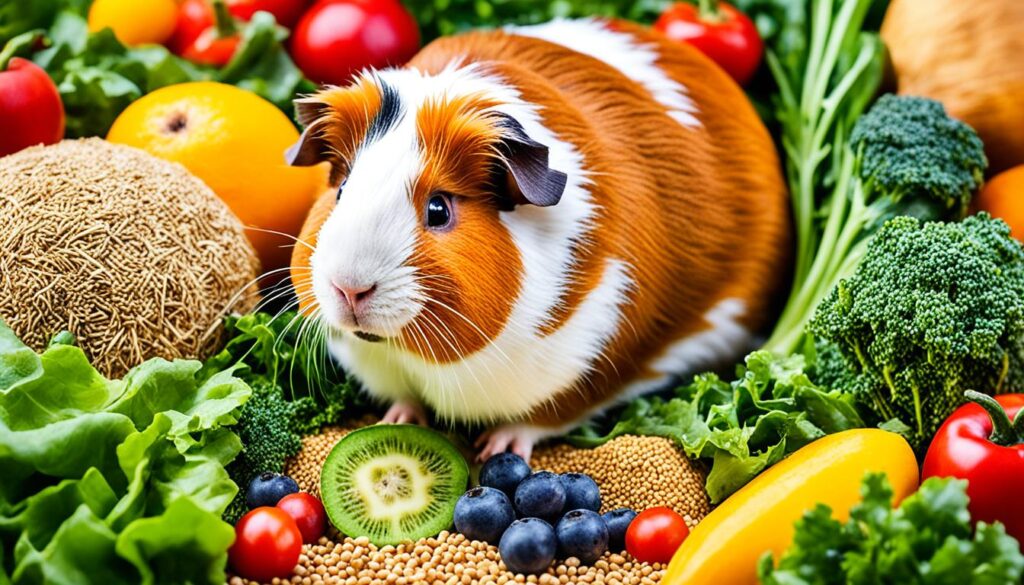
Behavior and Enrichment for Guinea Pigs
Guinea pigs have curious and vocal behaviors that make them delightful pets. They communicate through various noises, from high-pitched squeals of excitement to low purrs of contentment. Understanding their behaviors and providing the right environment can significantly impact their well-being.
Communication Through Vocalizations
Guinea pigs use vocalizations to express their emotions and needs. Pay attention to their sounds to better understand their behavior. If your guinea pig makes loud chirping or whistling sounds, it may be a sign of excitement or pleasure. On the other hand, prolonged teeth chattering could indicate fear or aggression. By familiarizing yourself with their vocalizations, you can better respond to their needs.
Foraging and Exploring
Guinea pigs are natural foragers. Providing them with opportunities to explore and forage not only keeps them physically active but also engages their natural instincts. Consider incorporating interactive toys that encourage foraging, such as treat puzzles or hiding food in various spots around their enclosure. This stimulates their mental and physical well-being, preventing boredom and encouraging natural behaviors.
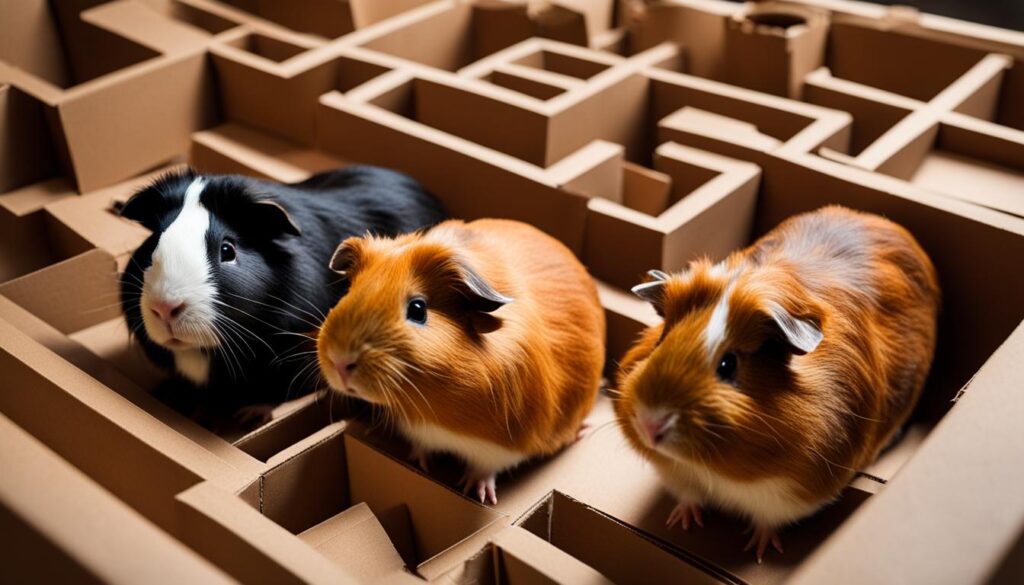
Enriching Toys and Hiding Places
Toys play a vital role in enriching a guinea pig’s environment. They provide mental stimulation, entertainment, and a means for exercise. Guinea pigs enjoy toys they can chew on, such as wooden blocks or balls made from guinea pig-safe materials. Hiding places, like cardboard tunnels or cozy fleece hideouts, offer them a sense of security and privacy. A variety of toys and hiding places not only keeps them entertained but also helps prevent boredom and stress.
Creating an Enriching Environment
In addition to toys, create an enriching environment for your guinea pigs. Arrange their living space to offer different levels and areas for exploration. Consider adding ramps, bridges, or platforms to increase the vertical space and provide an opportunity for climbing. Additionally, offer them safe and appropriate materials for burrowing and nesting. This simulated natural environment promotes their well-being and allows them to express their natural behaviors.
“Providing enrichment through toys and an engaging environment is crucial to keeping our guinea pigs happy and fulfilled.”
By understanding and catering to their behaviors, offering toys, and creating an enriching environment, you can ensure your guinea pigs lead happy and fulfilling lives. Their vocalizations, foraging instincts, and need for mental stimulation should be met to promote their overall well-being and create a strong bond with these charismatic pets.
Creating a Safe and Stimulating Environment
Creating the right environment for your guinea pigs is essential to their overall well-being. A safe and stimulating environment ensures they are happy and healthy. Here are some key considerations:
Space Requirements
Guinea pigs need plenty of space to move around and play. An enclosure that measures at least 4ft by 2ft, or larger, is ideal for one or two guinea pigs. This gives them enough room to exercise, explore their surroundings, and exhibit natural behaviors.
Hiding Places
Providing hiding places in their enclosure is crucial. Guinea pigs are prey animals and need places where they can retreat and feel safe. Consider adding tunnels, shelters, or even small cardboard boxes for them to hide in. These hiding places not only provide security but also promote natural behaviors and reduce stress.
Weather Considerations
When it comes to weather, guinea pigs are sensitive. Extreme heat or cold can negatively affect their health. During inclement weather, such as hot summers or harsh winters, it’s essential to provide your guinea pigs with a secure indoor space. This helps regulate their body temperature and protects them from potential hazards.
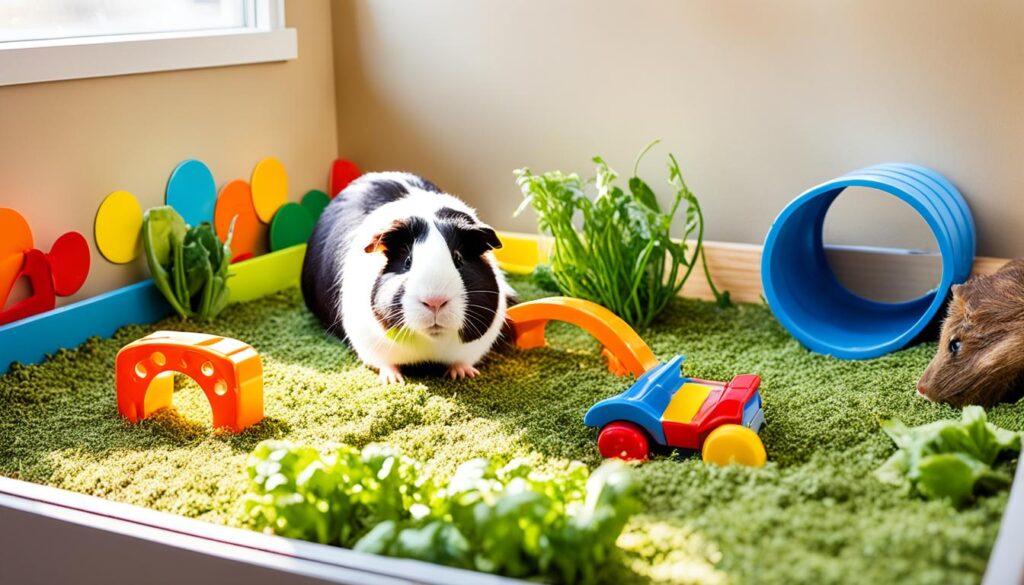
Cleaning and Removing Hazards
Regularly cleaning your guinea pig’s living area is important to maintain hygiene and prevent the buildup of germs or parasites. Clean the enclosure and remove any waste daily. Also, ensure there are no hazards like wires, toxic plants, or small objects that they could ingest. A clean and hazard-free environment keeps your guinea pigs safe and healthy.
| Key Elements for a Safe and Stimulating Environment | Benefits |
|---|---|
| Spacious enclosure | Allows for exercise and natural behaviors |
| Hiding places | Reduces stress and provides a sense of security |
| Indoor space for inclement weather | Protects guinea pigs from extreme temperatures |
| Regular cleaning | Maintains hygiene and prevents illness |
By creating a safe and stimulating environment, you are ensuring that your guinea pigs have the best possible living conditions. This allows them to thrive, exhibit natural behaviors, and enjoy a happy and healthy life.
Health Check and Common Health Issues
Regular health checks are crucial for the well-being of guinea pigs. By paying close attention to various aspects of their health, we can identify and address any potential issues early on. Here are some important areas to focus on when conducting a health check on your guinea pig:
Eyes and Ears
Inspect your guinea pig’s eyes for any signs of redness, discharge, or cloudiness, which may indicate an infection or injury. Similarly, check their ears for any swelling, redness, or excessive wax buildup, which could be a sign of ear mites or infection. If you notice any abnormalities, consult a veterinarian for further examination and treatment.
Teeth
Guinea pigs’ teeth continuously grow throughout their lives, so it’s essential to monitor their dental health. Look out for overgrown teeth, uneven wear, or drooling, as these may indicate dental problems. Provide them with a proper diet that includes sufficient hay and seek professional help if you suspect any dental issues.
Feet
Inspect your guinea pig’s feet for any signs of redness, swelling, or sores. These may indicate foot pad injuries or the presence of mites. Ensure their habitat is free from sharp or rough surfaces that could cause injuries, and consider providing a soft bedding material for added comfort.
Coat
Observe your guinea pig’s coat for any signs of hair loss, bald patches, or excessive scratching. These symptoms may be indicative of mites, fleas, or other skin conditions. Regular flea and mite treatment, along with proper grooming, can help prevent and address these issues.
Vitamin C Deficiency
Guinea pigs have a dietary requirement for vitamin C, and a deficiency can result in health problems, including scurvy. Ensure they have a diet rich in vitamin C or provide them with vitamin C supplements as recommended by a veterinarian to prevent deficiency-related issues.
Regular Flea and Mite Treatment
Prevention is key when it comes to flea and mite infestations. Use veterinarian-recommended flea and mite treatment products regularly to keep your guinea pig safe from these parasites. Consult with a veterinarian for the appropriate treatment options and frequency.
By conducting regular health checks and addressing any issues promptly, you can ensure your guinea pig remains healthy and happy. Remember to consult a qualified veterinarian for professional advice and guidance regarding the care and well-being of your furry friend.
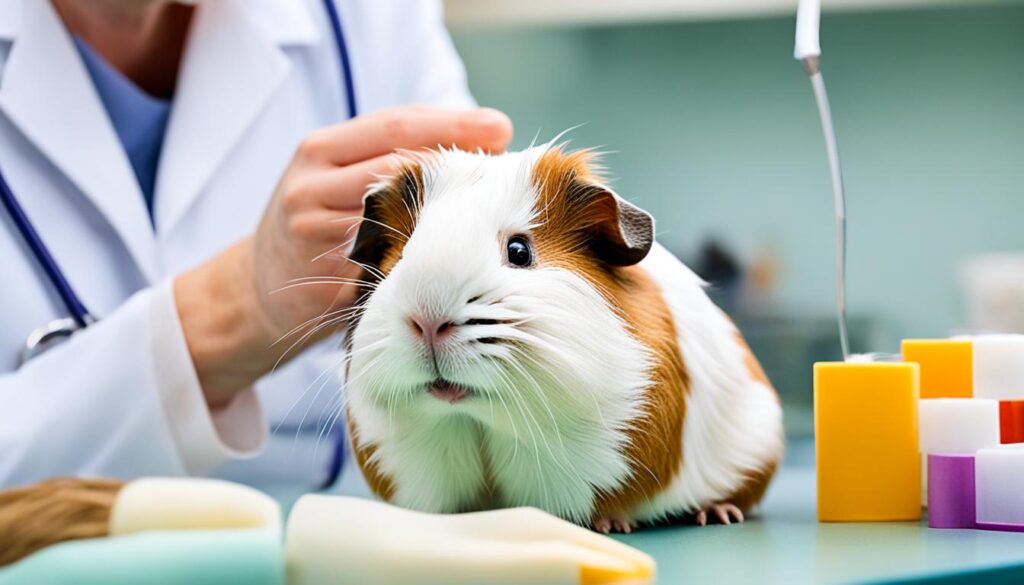
Companionship for Guinea Pigs
Guinea pigs are highly social animals and thrive in companionship. They are happiest when they have a guinea pig friend to interact with. Pairing them with another guinea pig of the same sex is ideal, as it allows them to engage in natural social behaviors and form strong bonds.
Unlike rabbits or chinchillas, which may have different social and dietary needs, guinea pigs are best paired with their own species. Rabbits and chinchillas have different communication styles and can display aggressive behavior towards guinea pigs. Therefore, it is best to keep them separate to ensure the well-being of all pets involved.
To foster a strong bond with your guinea pigs, regular handling and gentle interaction are key. Spend time with them each day, offering treats, and allowing them to become accustomed to your touch. This will help strengthen the bond between you and ensure the overall happiness of your guinea pigs.
Remember, guinea pigs are social animals that thrive on companionship. By providing them with a suitable guinea pig friend and engaging in regular handling, you can ensure they lead fulfilling and content lives.

Affectionate Companions
Guinea pigs have an endearing nature and often form strong bonds with their human companions. They enjoy gentle petting and cuddling, making them wonderful pets for people of all ages. Building a close relationship with your guinea pigs is a rewarding experience that brings joy and companionship into your life.
Pros and Cons of Companionship for Guinea Pigs
| Pros | Cons |
|---|---|
| Guinea pigs can engage in natural social behaviors and form strong bonds with their companions. | Pairing guinea pigs with incompatible mates can lead to territorial aggression or stress. |
| Companionship provides mental stimulation and reduces loneliness. | Introducing a new guinea pig requires careful introduction and monitoring to ensure compatibility. |
| Having a companion can help alleviate boredom and prevent behavioral issues. | Some guinea pigs may prefer solitude and become stressed in the presence of another guinea pig. |
Choosing the Right Housing for Your Guinea Pig
When it comes to housing your guinea pig, it’s important to provide an environment that meets their size and safety requirements. Guinea pigs need a cage that allows for ample space to move around and exercise. Look for a cage designed specifically for guinea pigs, as it will have the features needed to keep them comfortable and happy.
A key consideration is the size of the cage. Guinea pigs thrive in spacious environments, so opt for a cage that is at least 4ft by 2ft in size. This will give them room to roam, play, and explore. It’s also essential to choose a cage with a solid bottom. A solid bottom prevents any potential injuries caused by wire mesh and makes cleaning much easier in the long run.
When selecting a cage, look for features that provide extra habitat enrichment for your guinea pig. Ramps and second levels can add variety to their living space and allow for different levels of exploration. Guinea pigs also appreciate having a hiding place where they can retreat to when they need privacy or feel insecure.
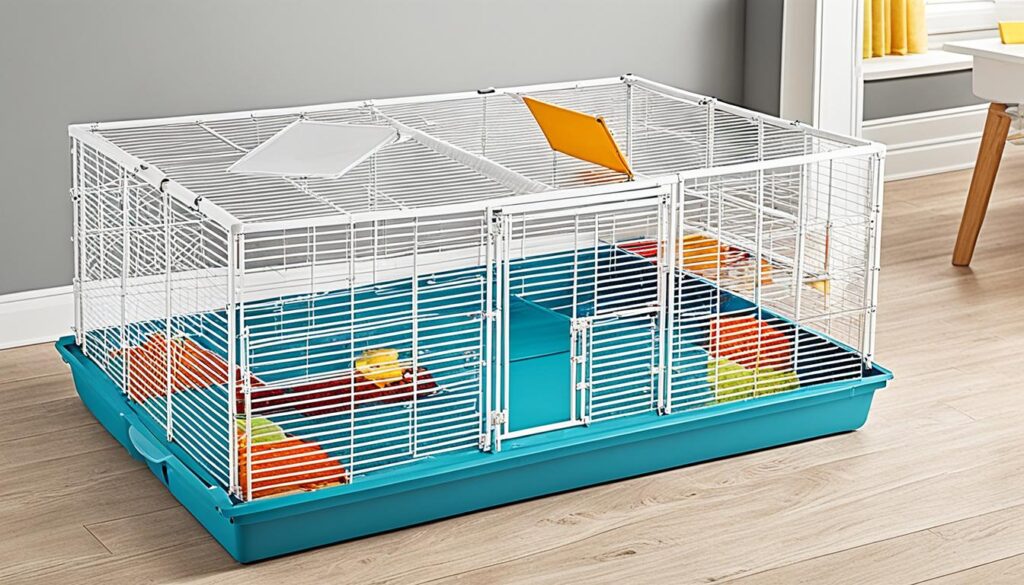
Keeping the guinea pig’s habitat clean is crucial for their health and well-being. Choose a cage with removable bottom trays that can be easily cleaned and sanitized. Regular cleaning helps prevent the buildup of bacteria and odors, ensuring a hygienic environment for your furry friend.
In addition to the cage, provide bedding for your guinea pig’s comfort. Choose bedding made specifically for small animals and avoid anything dusty or potentially harmful. Bedding made from recycled paper or straw can be a good choice, as it provides cushioning and absorbs moisture.
Overall, choosing the right housing for your guinea pig is essential for their happiness and well-being. By providing a spacious cage with a solid bottom, habitat features for enrichment, and easy cleaning options, you can create a comfortable and safe home for your furry companion.
Proper Nutrition for Guinea Pigs
Ensuring the proper nutrition for your guinea pig is essential for their overall health and well-being. A balanced diet consisting of high-quality guinea pig pellets, hay, fresh fruits and veggies, and adequate vitamin C is crucial to meet their nutritional needs.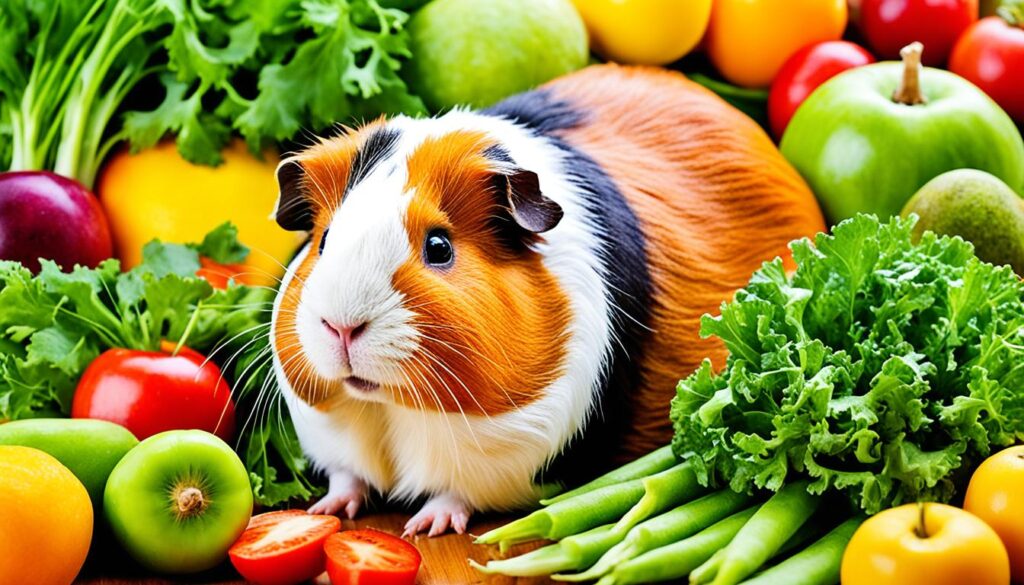
Guinea Pig Pellets
Guinea pig pellets serve as a staple food source and provide essential nutrients. Choose pellets specifically formulated for guinea pigs, as they contain the right balance of protein, fiber, and vitamins. Always have pellets accessible to your guinea pig, ensuring they have a constant supply.
Hay
Hay is a vital component of a guinea pig’s diet. It is rich in fiber, aiding in digestion and maintaining dental health. Providing unlimited access to fresh, clean hay throughout the day is crucial. Popular hay options for guinea pigs include timothy hay, orchard grass, and meadow hay.
Fresh Fruits and Veggies
Adding fresh fruits and vegetables to your guinea pig’s diet offers important vitamins and minerals. Aim to offer a variety of options daily, focusing on those rich in vitamin C, such as bell peppers, kale, and strawberries. It’s important to introduce new fruits and veggies gradually to avoid digestive upset.
Vitamin C Supplementation
Vitamin C is an essential nutrient for guinea pigs, as they cannot produce it on their own. Including vitamin C-rich foods in their diet is important for preventing deficiencies. However, guinea pig pellets and hay may not provide adequate levels of vitamin C. Consult with your veterinarian about additional vitamin C supplementation options, like liquid drops or chewable tablets.
Water
Alongside a balanced diet, clean and fresh water should always be available for your guinea pig. Check their water bottle regularly to ensure it is clean, not leaking, and filled with fresh water. Providing an adequate supply of water is crucial for their hydration and overall health.
| Food | Benefits |
|---|---|
| Guinea pig pellets |
– Provides essential nutrients – Convenient and readily available – Helps maintain healthy weight – Balanced source of protein, fiber, and vitamins |
| Hay |
– Promotes proper digestion – Supports dental health – Provides essential fiber – Prevents boredom and encourages natural foraging behavior |
| Fresh Fruits and Veggies |
– Rich in vitamins and minerals – Provides variety and flavor to the diet – Supports overall health and immune system – Helps prevent vitamin C deficiency |
| Vitamin C Supplementation |
– Prevents vitamin C deficiencies – Ensures optimal health and immune function – Consult with a veterinarian for proper dosage and administration |
By providing a well-balanced diet consisting of pellets, hay, fresh fruits and veggies, and sufficient vitamin C, you can support your guinea pig’s nutritional needs and contribute to their overall health and happiness. Remember to consult with your veterinarian for specific dietary recommendations based on your guinea pig’s age, weight, and any individual needs they may have.
Engaging Toys and Mental Stimulation
Guinea pigs love to play and stay mentally stimulated. Providing them with a variety of toys and activities is essential for their well-being. One of the most popular types of toys for guinea pigs is chew toys. These toys not only keep their teeth healthy but also provide entertainment and mental stimulation.

Wooden chews are a great option as they satisfy their natural instinct to gnaw. Choose toys made from safe materials, such as untreated wood, to ensure the safety of your guinea pig.
“Chew toys are not only a source of entertainment for guinea pigs but also help keep their teeth healthy.”
Another engaging toy for guinea pigs is a cardboard tunnel. These tunnels provide a fun and safe place for them to explore, hide, and play. You can find various sizes and shapes of cardboard tunnels, allowing your guinea pig to have different play experiences.
While providing toys is important, it’s equally crucial to avoid certain toys that can cause harm. Avoid using exercise wheels and balls as they can lead to back injuries. Instead, opt for toys that encourage natural behaviors and movements.
If you want to provide your guinea pig with more space to exercise and explore, consider using an exercise pen. An exercise pen is a portable enclosure that allows your guinea pig to roam freely outside of their cage while still being in a secure environment.
| Benefits of Chew Toys and Cardboard Tunnels | Benefits of an Exercise Pen |
|---|---|
|
|
Remember, while toys and an exercise pen can provide entertainment and mental stimulation, guinea pigs also crave human interaction and affection. Make sure to spend quality time with your furry friend, offering them love and attention. Your guinea pig will appreciate the connection and thrive in a stimulating environment.
Basic Care and Grooming for Guinea Pigs
Proper care and grooming are essential for the health and well-being of your guinea pigs. Regular maintenance, including monitoring their dental health, trimming their nails, and regular grooming for long-haired breeds, is necessary to keep them comfortable and happy. By providing them with appropriate chew toys and ensuring routine veterinary check-ups, you can ensure your guinea pigs receive the care they need.
Dental Health
Guinea pigs’ teeth continuously grow throughout their lives, which is why dental health is crucial for them. To promote natural wear of their teeth, provide them with appropriate chew toys made of safe materials. These chew toys not only provide mental stimulation but also help in keeping their teeth at a proper length.
Nail Trimming
Regular nail trims are necessary to prevent overgrowth and discomfort. Guinea pigs’ nails can become long and sharp, making it difficult for them to walk and causing potential injuries. Use guinea pig-specific nail clippers to carefully trim their nails, taking care not to cut into the blood vessel (quick) inside the nail. If you’re unsure or uncomfortable doing it yourself, ask your veterinarian or a professional groomer for assistance.
Grooming for Long-haired Breeds
Long-haired guinea pig breeds, like Peruvians and Shelties, require additional grooming to prevent matting and tangles. Regular brushing is necessary to keep their fur healthy and free from debris. Use a soft-bristle brush or a brush specifically designed for guinea pigs to gently remove any tangles or loose fur. If the fur becomes severely matted, it may need to be carefully clipped or shaved by a professional groomer. Pay close attention to the skin for any signs of irritation or sores.
Veterinary Check-ups
Regular veterinary check-ups are essential to ensure your guinea pigs’ overall health and detect any potential issues early. During these visits, the veterinarian will examine their teeth, nails, skin, and overall condition. They may also administer any necessary vaccinations and recommend treatments for parasites or other common health issues. It’s important to closely monitor your guinea pigs’ behavior, appetite, and bathroom habits and seek immediate veterinary attention if you notice any changes or signs of discomfort or illness.
By following proper care and grooming practices for your guinea pigs, you can ensure their well-being and provide them with a comfortable and happy life.
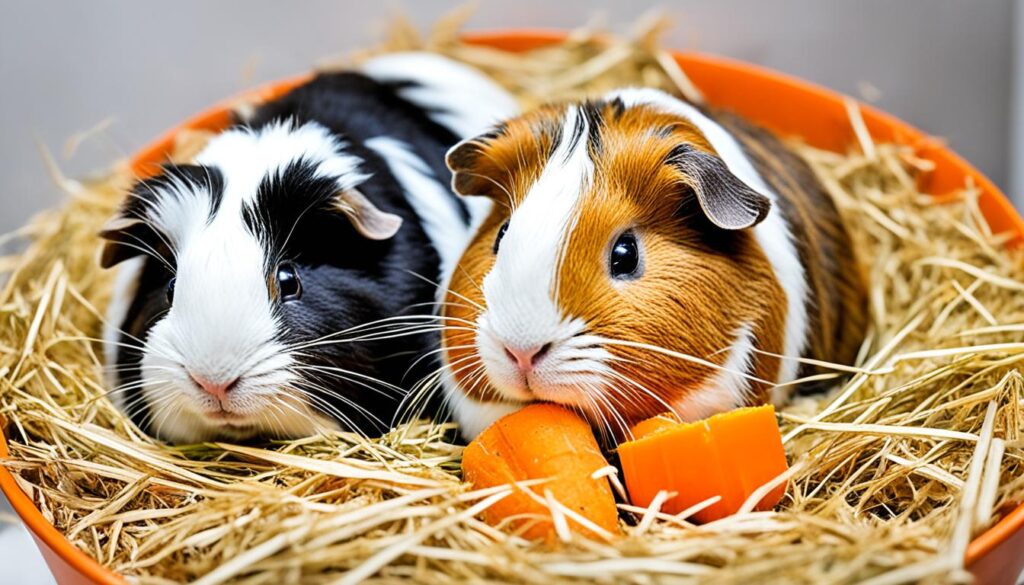
The Joys of Guinea Pig Ownership
Owning a guinea pig is a delightful experience that brings joy and companionship into our lives. These adorable creatures become cherished members of our families, filling our days with love and happiness. However, with great love comes great responsibility. It is crucial to provide them with the care they need to ensure their well-being and happiness.
Guinea pigs thrive on love and attention. They are social animals that enjoy our company and affection. Spending quality time with them, gently handling and interacting with them, helps to build a strong bond and ensures their overall happiness.
When bringing a guinea pig home, it’s essential to have the necessary supplies prepared. Start with a suitable cage that provides enough space for them to move around comfortably. A solid-bottom cage is recommended to avoid any foot issues. Don’t forget to include bedding, such as soft hay or paper-based materials, to create a cozy and comfortable environment.

A well-balanced diet is crucial for their health. Provide high-quality guinea pig pellets as their main food source and always have fresh hay available for grazing. Additionally, include a variety of fresh fruits and vegetables in their daily meals to ensure they receive the necessary nutrients. Remember, guinea pigs require vitamin C, so it’s important to choose foods rich in this essential nutrient.
“Guinea pigs are delightful pets that bring so much joy into our lives. Providing them with proper care and attention ensures their happiness and well-being.”
As responsible guinea pig owners, we must also prioritize their mental and physical stimulation. Offer a variety of toys, such as chew toys and tunnels, to keep them entertained and engaged. Guinea pigs love exploring and foraging, so creating an enriching environment with hiding places and opportunities for play is essential.
Never forget that guinea pig ownership comes with responsibilities. Regularly clean their cage to maintain cleanliness and prevent any health issues. Schedule regular veterinary check-ups to ensure their health is in top condition and address any concerns as early as possible.
The rewards of guinea pig ownership are immeasurable. These little creatures bring endless joy and happiness into our lives. By providing them with love, attention, and proper care, we create a fulfilling and enriching life for both them and ourselves. So, embrace the joys of guinea pig ownership and experience the unconditional love and companionship they offer.
Conclusion
In conclusion, caring for guinea pigs is essential for their overall well-being. By providing a suitable environment, nutrition, companionship, and attention, you can ensure your guinea pig leads a happy and healthy life. Remember to prioritize their needs and create a safe and stimulating living space that allows them to exhibit their natural behaviors.
Guinea pigs thrive when they have a spacious cage, complete with hiding places, toys, and tunnels for mental stimulation and entertainment. Monitor their diet and ensure they receive a balanced and nutritious meal, including hay, pellets, and a variety of fresh fruits and vegetables to meet their dietary needs.
Building a strong bond with your guinea pig through regular handling and affection is crucial for their well-being. Conducting health checks and being attentive to any signs of illness or discomfort ensures early intervention, if necessary. Remember, providing the love and care that guinea pigs deserve is not only your responsibility as an owner but also a rewarding and joyous experience.
